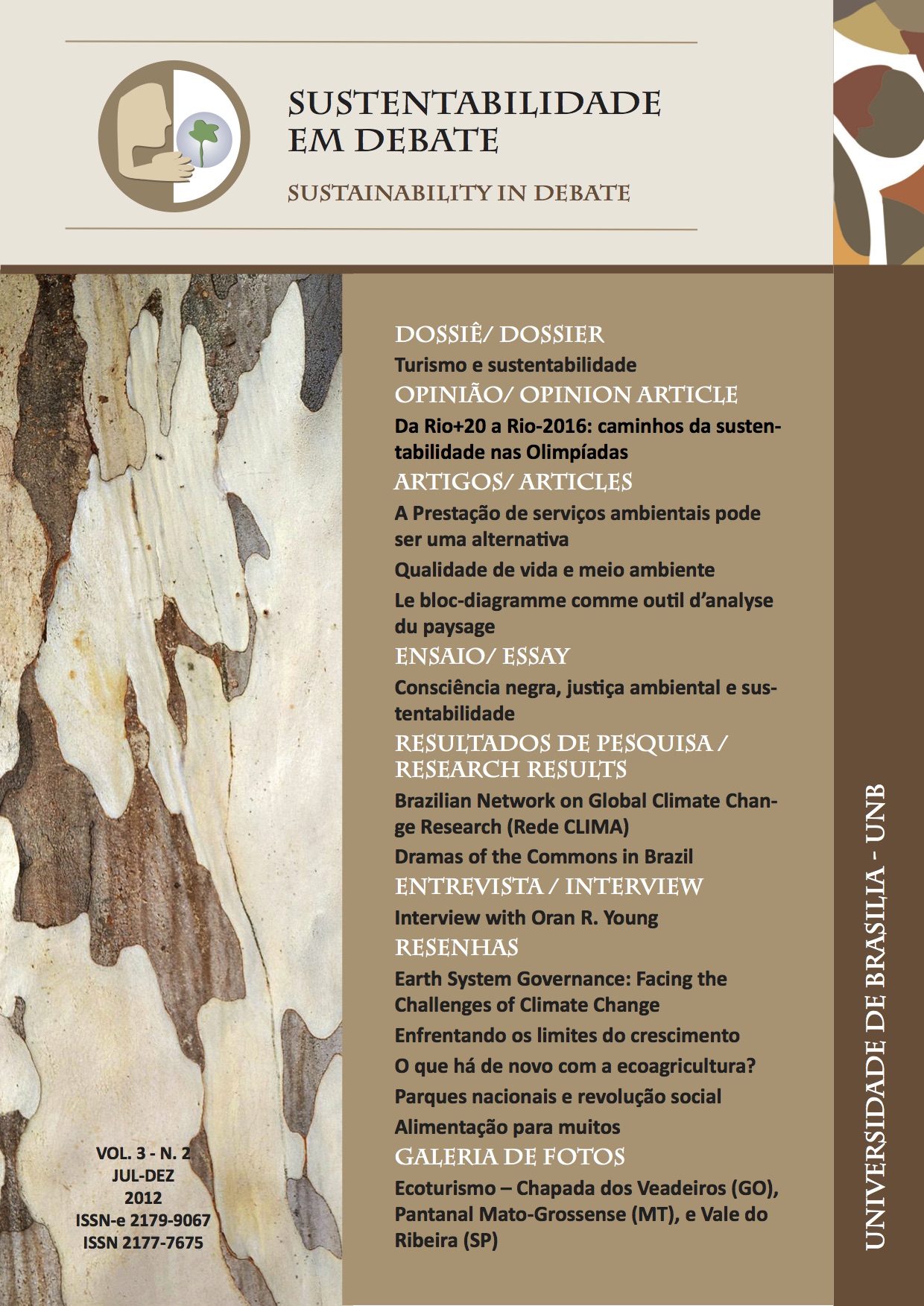Da Rio+20 a Rio-2016:
caminhos da sustentabilidade nas olimpíadas
DOI:
https://doi.org/10.18472/SustDeb.v3n2.2012.8131Keywords:
Olympic games; IOC ”“ International Olympic Committee; Rio-92, Rio 20; Rio de Janeiro., Olympic games, IOC - International Olympic Committee, Rio-92, Rio 20, Rio de JaneiroAbstract
This article seeks to analyze the way the Olympic Games have incorporated the main sustainability commitments agreed upon during the Rio 92, Rio + 10 and Rio + 20 Conferences, both in their planning and their operational processes, thus influencing host cities in the construction of the Games’ legacy. Tourism is one of the mainstays of Rio’s economy, and the link between the Games and the city’s images will be lasting.
The Olympic games will influence the quantity and the quality of the touristic demand during, but especially after the event. They will showcase the city’s innovative initiatives for sustainability. The IOC can play a vital role orienting those initiatives. The Games’sustainability legacy may constitute an opportunity for the city to change its image for ever. We still have three years ahead of us to advance, but the basis need to be settled now.
Downloads
References
Olympic System. New York: Routledge. 2008.
COI- Comitê Olímpico Internacional. Carta Olímpica, Fevereiro, 2003. Versão do
Comitê Olímpico Português. http://www.idesporto.pt/DATA/DOCS/LEGISLACAO/
doc141.pdf acessada em 23/12/2012.
ELKINGTON, J. Cannibals with Forks: The Triple Bottom Line of 21st Century Business . Oxford: Capstone Publishing Ltd. 1997.
ESRC - The Economic & Social Research Council. Olympic Games Impact Study ”“
London 2012 Pre-Games Report. London: ESRC, 2010.
ESTY, D. C. and WINSTON, A. Green to Gold: How Smart Companies Use Environmental
Strategy to Innovate, Create Value, and Build Competitive Advantage. New Jersey:
Wiley & Sons Inc. 2009.
FLORES, MAUREEN (2012) Citius, Altius, Fortius. A Sustentabilidade e o Comitê
Olimpico Internacional. Rascunho da Tese (Doutorado em Políticas Públicas, Estratégias
e Desenvolvimento)- Instituto de Economia da Universidade Federal do Rio
de Janeiro, Rio de Janeiro, 2012.
HART, S. Beyond Greening: Strategies for a Sustainable World. Harvard Business
Review, p. 65-76. 1997.
HART, S. Capitalism at the Crossroads: Next Generation Business Strategies for aPost-
Crisis World. New Jersey: Prentice Hall. 2006.
IOC. Sustainability Through Sports. Implementing the Olympic Movement’s Agenda
21 Documento disponível no site: http://www.olympic.org/Documents/
Commissions_PDFfiles/SportAndEnvironment/Sustainability_Through_Sport.pdf
acessado em 22/12/2012. Lausanne: IOC, 2012a.
IOC- International Olympic Committee. Guide on Olympic Legacy 5th updated cycle
- post Vancouver Winter Games. Lausanne: IOC, 2012b.
IOC and UNEP. THE DOHA DECLARATION. THE 9th WORLD CONFERENCE ON SPORT
AND THE ENVIRONMENT. Documento disponível no site http://www.olympic.org/
D o c u m e n t s / O l y m p i s m _ i n _ a c t i o n / S p o r t _ a n d _ E n v i r o n m e n t /
Doha_Declaration_Final.pdf acessado em no dia 21/12/2012. Lausanne: OIC, 2011.
IOC and UNEP. THE BEIJING DECLARATION. FIFTH WORLD FORUM ON SPORT,
EDUCATION AND CULTURE. Documento disponível no site: http://www.olympic.org/
Documents/Conferences_Forums_and_Events/Sport_Culture_and_Education/
Beijing_World_Forum_Resolutions-eng.pdf acessado em 23/12/2012. Lausanne: OIC,
2006.
IOC. Olympic Youth Development Centre in Lusaka, Zambia. Documento disponível
no site: http://www.olympic.org/Documents/Commissions_PDFfiles/sports-forhope-
brochure.pdf acessado em 21/12/2012.Lausanne: OIC, s/d.
PAIVA, K. O Movimento Olímpico e o Meio Ambiente no contexto da Rio + 10. In: M.
D. Turini, coletanea de textos em estudos olímpicos, v.1, p. 131-139. Rio de Janeiro:
Editora Gama Filho. 2002.
PUPPIM DE OLIVEIRA, Jose A. (Ed.). Green Economy and Good Governance for
Sustainable Development: Opportunities, Promises and Concerns. Tokyo: United
Nations University Press, 2012.
PUPPIM DE OLIVEIRA, Jose A. (2008). Empresas na Sociedade: Sustentabilidade e
Responsabilidade Social. Rio de Janeiro: Editora Campus/Elsevier, 2008.
RioOnWatch. Site do Rio on Watch: http://rioonwatch.org/?p=5730 acessado em
26/12/2012.
SOCHI 2014. Site dos Jogos de Sochi: http://www.sochi2014.com/en/games/
strategy/legacy_games/ acessado em 21/12/2012.
UNEP- United Nations Environment Programme. UNEP and the International Olympic
Committee. Informação publicada no site: http://www.unep.org/sport_env/
Olympics_UNEP.aspx consultado em 23/12/2012.
Downloads
Published
How to Cite
Issue
Section
License
SUSTAINABILITY IN DEBATE – Copyright Statement
The submission of original scientific work(s) by the authors, as the copyright holders of the text(s) sent to the journal, under the terms of Law 9.610/98, implies in the concession of copyrights of printed and/or digital publication to the Sustainability in Debate Journal of the article(s) approved for publication purposes, in a single issue of the journal. Furthermore, approved scientific work(s) will be released without any charge, or any kind of copyright reimbursement, through the journal’s website, for reading, printing and/or downloading of the text file, from the date of acceptance for publication purposes. Therefore, the authors, when submitting the article (s) to the journal, and gratuitous assignment of copyrights related to the submitted scientific work, are fully aware that they will not be remunerated for the publication of the article(s) in the journal.
The Sustainability in Debate Journal is licensed under Creative Commons License – Non-Commercial-No-Derivation Attribution (Derivative Work Ban) 3.0 Brazil, aiming at dissemination of scientific knowledge, as indicated on the journal's website, which allows the text to be shared, and be recognized in regards to its authorship and original publication in this journal.
Authors are allowed to sign additional contracts separately, for non-exclusive distribution of the works published in the Sustainability in Debate Journal (for example, in a book chapter), provided that it is expressed the texts were originally published in this journal. Authors are allowed and encouraged to publish and distribute their text online, following publication in Sustainability in Debate (e.g. in institutional repositories or their personal pages). The authors expressly agree to the terms of this Copyright Statement, which will be applied following the submission and publishing by this journal.








